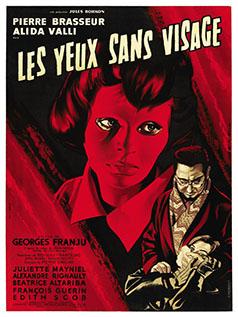The relationship between fathers and daughters is intangibly profound. (I can’t speak for fathers and sons, from either side of the equation.) That was the angle that Georges Franju took when approaching Eyes Without a Face. I have to confess that I knew the basic idea behind this movie and it took years to build up the courage to watch it. I’m squeamish, and the fear that the film might show too much was a very real fear. After you watch a movie, it can’t be unseen. Still, it is a classic of the horror genre (although that is disputed) and it gets referenced all the time. In case you haven’t heard about it, a plastic surgeon is attempting to graft a new face onto his daughter after she’s mutilated in an automobile accident. Things, as you might guess, don’t go as planned.

Critics didn’t care for the movie when it was first released, but, as we’ve seen from time to time, re-evaluation changes things. It is now considered good enough to be part of the Criterion Collection and ratings on the usual websites are quite favorable. It’s often cited for its poetic treatment of the subject, and the response of Christiane, the daughter, seems to bear that out as she moves from complicit in her father’s crimes to sympathetic to his victims. Indeed, the surgeon himself is conflicted, but that father-daughter relationship is something he can’t ignore. He seems compelled to help her at any cost—it’s the price of parenting, I suppose. It’s not for the weak. But we’re in movie-land, aren’t we?
Christiane is sympathetic to the animals her father uses for his experiments. When she frees them, after releasing the last intended victim, she’s depicted St. Francis-like, with the doves. Knowing her own suffering, she can’t bear to impose it on another. Our bodies are how we present ourselves to the world. We rely on faces to tell us much of what we need to know, even without words passing between us. Interestingly, even when wearing her mask, Christiane’s eyes tell the viewer much of what she’s experiencing internally. Poetic, as the critics say. If there’s a monster here, however, he’s driven out of love in the context of an imperfect world. Eyes Without a Face works as a horror film and the reported fainting that took place among viewers early on demonstrate that we tend to feel for others, just as Christiane comes to. And the father? Well, that’s the unanswered question. He’s a victim in his own way.
